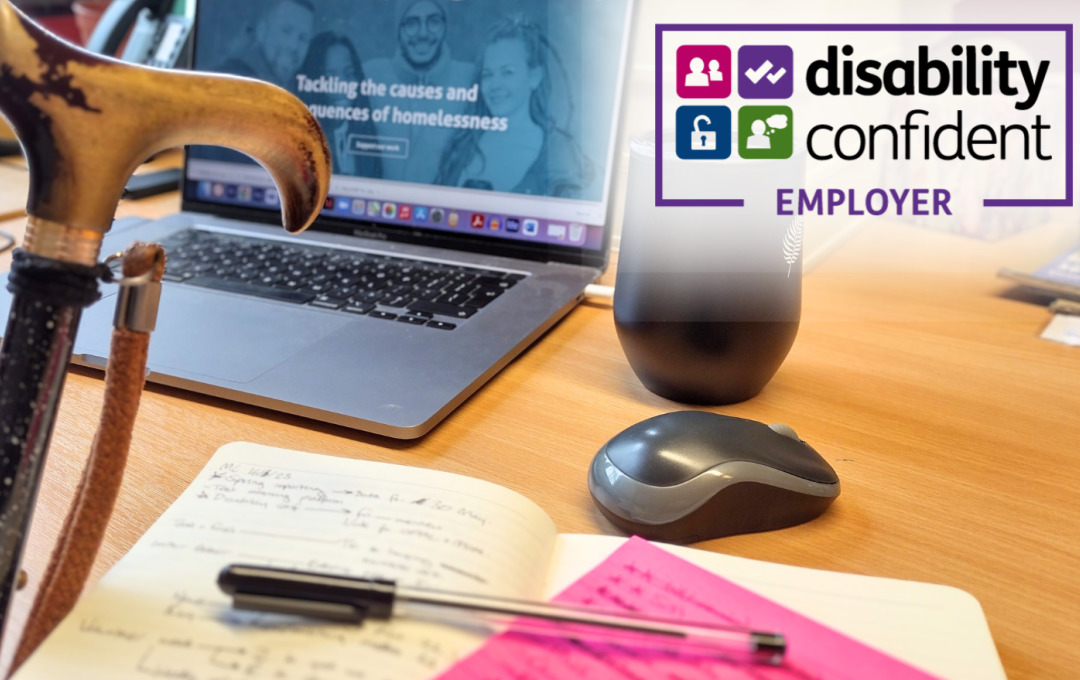Working without barriers

In Mental Health Awareness Week, we are highlighting our recent accreditation as a Disability Confident Employer. Ruth Wilkinson, Marketing and Communications Officer at Cyrenians, explores why we need to meet people where they’re at.
Two years after pledging its commitment to becoming a disability inclusive employer, Cyrenians has recently been recognised as a Disability Confident Employer (level 2). The accreditation recognises the work our staff have been doing to make sure our services and workplace are accessible and open to all.
As a homelessness organisation, inclusion is important to us, but what does this look like in practise?
Why do we need to focus on inclusion?
Disability inclusion is part of our long-standing commitment to seeing people, not problems. As someone with multiple disabilities myself, one of the most frustrating parts of being disabled is that you often find yourself being treated as a problem to be solved.
When you’re spending a huge amount of your energy just trying to get through the door, it can be exhausting. Every day can feel like an uphill battle just to get to the point other people are starting from – and that work can be utterly invisible to people around you. All others may see is that it takes you longer to do things, or that you get burned out faster.
Often, fairly small adjustments would make a huge difference – but with the stigma often attached to disability, it’s no surprise that we're often hesitant to bring up adaptations we need. But without support, disabled people often find ourselves pushed out of work or unable to progress our careers, isolated from our wider communities, and struggling to make ourselves heard or included.
By creating workplaces and services where we can welcome all of someone – neither ignoring their struggles, disadvantages or individual experiences, nor treating that as the whole of who they are – we can create spaces where people are free to bring all of themselves.
If we don’t work to create open, inclusive and supportive spaces for everyone, we certainly can’t claim to be living up to our values of compassion, respect and integrity. But breaking down the barriers that keep people out isn’t just about being inclusive for the sake of it. When we don’t actively work to include people who are often pushed out or silenced, we’re cutting ourselves off from everything those people have to share – their knowledge, experience, skills, and their part in our communities.
At least 1 in 5 people in Scotland experience a disability which affects their everyday life. When no effort’s made to meet people where they’re at – whether that’s with physical or mental health issues, sensory or mobility impairment, chronic illness, or with past trauma – that leaves millions of people facing a constant uphill battle to be heard. And that’s not just bad for those of us who are disabled – it's bad for everyone.
Understanding and welcoming the diversity and depth of individual needs, struggles and experiences is vital to building lasting positive change.
The work we’ve put into qualifying as Disability Confident Employers will have far-reaching impacts not just on our staff wellbeing, but on the work we do too. By making sure that disabled people have an equal voice in Cyrenians, removing barriers that might keep people from staying with us long-term or moving onto leadership roles, we make sure we have a diversity of experience and knowledge among the people administering our services.
What does disability inclusion mean?
Disability is a very broad term, and that’s intentional. Not every disability is visible and whether or not people identify as disabled can be very personal.
At Cyrenians, we use the “social model” of disability, which recognises that disability doesn’t refer to someone’s physical or mental condition in and of itself, but the ways in which the world around them presents barriers or stigmas because of it. We believe that, while things like sensory impairments, mobility issues or chronic illnesses may always be part of somebody’s life, the way that we, individually and as an organisation, respond to this is what makes or breaks anyone’s ability to be an equal part of their community and their workplace.
Responding confidently and supportively to disabled people’s needs can take as many forms as there are people. It means proactively creating space to talk about and listen to what people need, and trusting that they know their own needs best.
It’s easy to make assumptions about what people with a specific disability might need, but even two people with the exact same disability may need radically different things to feel safe, comfortable and able to work without barriers.
Part of being a Disability Confident Employer for us means being informed, aware and prepared to offer options – whether that’s adaptive ways of working, translation for people with sensory impairments, additional support, or clear boundaries around what’s asked of people. But an equally important part is being ready, at all levels, to really listen to what people need, and to be prepared to meet them where they're at.